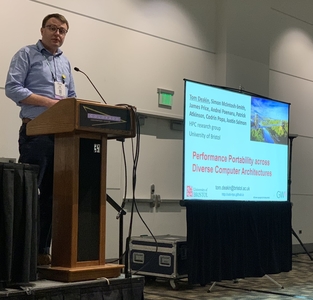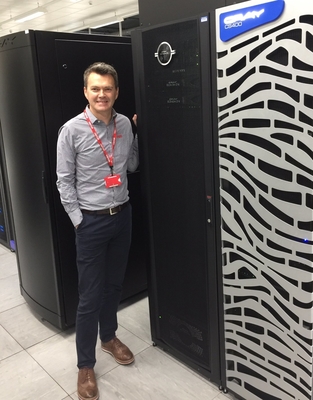The University of Bristol has a long and successful history of collaboration with Intel, which resulted in the first Intel® Parallel Computing Center being established in the UK in 2014. This new Intel oneAPI Center of Excellence extends the joint venture for enabling high-performance applications on processors of today and in the future.
Performance Portability at Exascale with SYCL and oneAPI
Scientific codes strive to achieve high performance on heterogeneous systems, consisting of a combination of CPU and GPU architectures. These applications need to run efficiently across a range of processors taking full advantage of the capabilities of the hardware on which they execute. Achieving performance portability is challenging because different programming methods are typically used for different architectures. The collaboration between Bristol and Intel through this oneAPI Center of Excellence will develop and share best practices on how to make applications performance portable at exascale through unified heterogeneous programming using SYCL together with oneAPI.
Through the Bristol Intel oneAPI Center of Excellence, Bristol will develop, document and share gold-standard best practices for developing scalable SYCL applications for exascale. With SYCL being supported by Intel’s oneAPI DPC++/C++ compiler and code migration tools, developers can write portable programs for heterogeoenous systems that run with high efficiency on a range of processor classes. By showcasing the best practices for realising performance portability, this project is a crucial part of highlighting the benefits of open standard heterogeneous parallel programming models for achieving exascale milestones and providing an open choice in hardware by easing adoption of new cross-vendor architectures.
The Center will initially work with two applications that Bristol contributed to the new SPEC HPC suite of benchmarks: CloverLeaf and TeaLeaf. SPEC HPC is a forward-looking collection of applications, capable of stressing heterogeneous systems with input sizes ranging from single node all the way up to exascale-sized problems. These codes are representive of important scientific applications, so it is crucial these algorithms perform well across the diverse exascale processor landscape. Bristol will develop scalable SYCL versions of these key benchmarks to showcase best practice for performance portability, including optimisations for CPUs and GPUs from Intel and other vendors.
Dr Tom Deakin, Bristol’s Principal Investigator and Lecturer in Advanced Computer Systems, said: “The SYCL parallel programming model enables performance portability, however achieving this in practice is not always easy. Becoming a oneAPI Center of Excellence will allow us to share our expert knowledge of SYCL and performance portability, and enable developers to write fast HPC applications more productively on CPUs and GPUs.”
Professor Simon McIntosh-Smith, head of the HPC Research Group in Bristol, said: “This new partnership builds on our long-standing collaboration with Intel. Our research group is a world-leader in finding solutions to enable scientific codes to be performance portable across the most advanced hardware, and we see oneAPI as a vital piece of this puzzle".
“This new Center of Excellence at the University of Bristol builds on many years of collaboration with Intel spanning applied research into performance portability, standards, and best practices for developers of high-performance applications,” said Joe Curley, vice president and general manager of Intel Software Products and Ecosystem group. “We look forward to discovering and sharing new best practices for developers based on multiarchitecture, multivendor languages like SYCL as part of the oneAPI initiative.”

